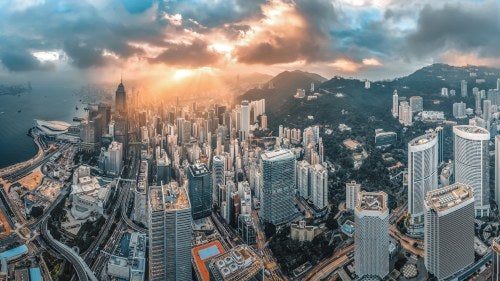Global Cities: Antidote to Political Isolationism

Given the rising global threats, turning inward is a politically expedient platform. But overcoming global challenges requires trust and cooperation.
The world is entering a new age of anxiety. Globalization and disruptive technologies are changing job markets in both established and emerging economies. Territorial disputes are forcing countries into costly arms races, while terrorism and oppression are generating waves of migration. The specter of global pandemic grows with each new disease outbreak. Given such threats, turning inward is becoming a politically expedient policy platform. Yet overcoming global challenges requires exactly the opposite approach: trust, international cooperation, and information sharing.
Panicky nations are refusing to acknowledge this, but global cities can. With their networks, diversity, and culture of pragmatism, global cities can take on the tedious work of improving opportunities for their citizens. This difficult task will involve defiance, dialogue, and diplomacy. But with any luck, global cities can provide the antidote to growing national isolationism.
Where there is anxiety, political opportunism looms. Demagogues rally their base by attributing threats to external enemies and underrepresented populations. Ethnic minorities are branded job-takers and religious minorities stereotyped as covert infiltrators; they bear unjustifiable blame for a multitude of grievances. Political movements around the world exhibit this trend, with growing right-wing nationalism in Europe, “strongman” politics in Russia and the Philippines, and tightening authoritarianism in Turkey, Malaysia, and China. In the United States, a brash political novice secured the presidential nomination with promises of closed borders and racial profiling, while the recent British vote to exit the European Union reflects nationalist skepticism about the value of cooperative regional governance.
These trends point toward a daunting prospect: the 21st century may see major superpowers ruled by populist autocrats. But cities can chart their own way.
First, cities must show defiance by banding together, using collaboration to push back against re-centralization and attempts by national leaders to consolidate power under the guise of security. To accomplish this, global cities and their domestic peers should collaborate. Political divides between urban and national governments have been long evident in voting patterns, yet many cities now share development objectives, such as growth strategies stressing amenities that attract knowledge workers. As such, increased city networking within nations would generate a political and economic bloc to counterbalance national power, particularly autocratic and isolationist interests.
Second, cities must win the marketplace of development ideas through dialogue, demonstrating how openness and diversity attracts talent to produce solutions for actual threats like disease, poverty, security, environmental degradation, and climate change. Cities, with their world class universities, research laboratories, and cutting-edge companies, are incubators for social and economic progress in a world that now seems content to regress. Selling ideas in favor of openness requires a comprehensive effort involving media, high-visibility events, and scholarly institutions.
Finally, cities must prepare to survive the economic consequences of isolationism through diplomacy—international urban diplomacy that strengthens economic ties with city and national governments worldwide. Urban leaders can take the lead to foster international connections and directly support their own economic development strategies. While there are some national-level policies that city governments cannot overcome, cities can exert collective influence on counter national regulations regarding openness, connectivity, and diversity that might otherwise impede their ability to act globally.
“Global” is as much an attitude as a status; even small cities have international ambitions and philosophies. However, national governments can weaken a city’s influence regardless of its size or importance to the global economy. To escape this fate and realize their potential, cities must proudly embrace the attributes that made them prosper, turning them into economic and cultural capitals. As agents of openness, moderation, and pragmatism, global cities provide the antidote to growing national isolationism in an otherwise politically volatile era.

